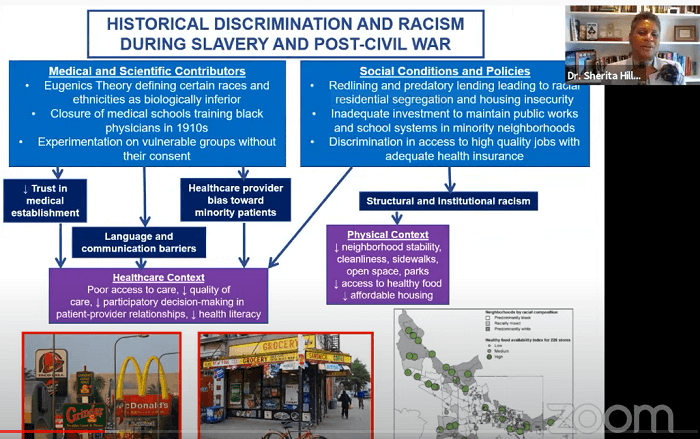
There is a direct line between the message of systemic racism that has been playing out across America and the disproportionate impact of COVID-19 on African-American and other minority communities in Maryland.
As Dr. Sherita Hill Golden of Johns Hopkins laid out for legislators at a COVID-19 Workgroup meeting June 10, the seeds of racism were planted in the legacy of slavery. Laws and policies, such as redlining, sprouted and from those seeds came racial discrimination and housing insecurity. The branches that then grew in those neighborhoods resulted in insufficient funding for schools and a lack of financial investment in core services such as transportation and businesses such as grocery stores.
These inequities have been exacerbated by the pandemic and that has compounded the challenges posed by an understandable lack of trust in the medical system and ready access to health care services.
Public health experts, and those who advocate for vulnerable populations, have long recognized the imperative to address these social disparities as central to achieving the intertwined goals of health equity and racial justice. As this relates to the pandemic, one area where the inequities are glaringly obvious is that of COVID-19 testing.
In her presentation, Dr. Golden emphasized that testing should be expanded and “prioritized” in underserved communities. However, we know from reporting in The Baltimore Sun that hundreds were turned away from testing sites in the city. As the Rev. Bruce Lewandowski of the Sacred Heart of Jesus Catholic Church said, “Sadly, we’ve had parishioners who’ve been in line for hours waiting to be tested, go home untested, and die.”
This is unacceptable, and the Hogan administration must do all it can to address this immediately. To do so will require comprehensive data, which I will discuss further.
First, though, let us consider Congressman John Lewis’ admonition to “make good trouble.” Now is the time for Maryland’s leaders in the government and legislature to do just that.
They must seize the opportunity to address the disparities brought to light by the confluence of George Floyd’s murder and the pandemic. In so doing, it is important to acknowledge that some steps have been taken as Maryland has transformed its health care system. However, not enough has been done in a comprehensive, systematic and cross-agency process that has included a cohesive, consumer-oriented communications plan.
Such a plan would be undergirded by data collection and reporting to include race, ethnicity, gender and language at the nine-digit ZIP code level, as Dr. Golden recommended to the legislators.
On the positive side, Gov, Larry Hogan, reacting to pressure from elected officials and others, did move to require the reporting of race, ethnicity and gender data. However, the data is not provided at the ZIP code level and language preference is not included. In addition, as I have written before, Maryland’s coronavirus website — the primary public source for information — is available in English only.
Del. Joseline Pena-Melnyk, vice chair of the House Health and Government Operations Committee, is currently evaluating the need for legislation to require the collection of more comprehensive and actionable information. Such an effort must address the need for more transparent and accessible reporting.
To evaluate the gaps in both the collection and reporting of data one has to ask why this hasn’t been a priority for the Office of Minority Health and Health Disparities at the Maryland Department of Health since Gov. Hogan took office in 2015? That, at least, is the only conclusion I could draw after a thorough review of publicly available resources on its website.
Here are just a few examples of why I say that:
- The tab, “Health Equity Data by Year,” yields no data more recent than 2013
- Apparently no 2019 annual report was sent to the legislature in January 2020
- A search of Maryland’s racial/ethnic population brings up 2010 data while a search for the racial composition of Maryland cites the 2012 American Community Survey.
- Data and resource publications for African-American, Hispanics, and Asian and Pacific Islanders dates to 2013.
In September 2014, the O’Malley administration completed a public health needs assessment. Its purpose is “to understand the health status of Maryland’s diverse communities with a focus on populations who experience poorer health outcomes.” This built upon previous work to address health disparities, including the establishment of Health Enterprise Zones and was designed to provide a road map for the future.
It is unfortunate the Hogan administration never took that assessment off the shelf and shameful that they have not prioritized OMHHD’s work to address health equity data collection and reporting. Equally disturbing is the fact that the governor has ignored a letter sent by the Public Justice Center and other policy and advocacy organizations to address racial disparities in Maryland’s response to COVID-19. The recommendations they made April 7 are just as timely as they were more than two months ago.
It seems ironic that just before the pandemic hit, in February 2020, Gov. Hogan received an award from the American Medical Association to recognize his “setting an example [of outstanding government service] for the rest of the country.”
Perhaps it would be helpful to remind the governor and those charged with leading our health care efforts that the AMA’s “Prioritizing Equity” agenda states that “data drives optimal response” and that “having race and ethnicity data is at the heart of understanding injustice in health and healthcare and ensuring optimal health, and fairness, for all people in this country.”
Gov. Hogan should embrace that agenda. If not now, when?
–LENI PRESTON
The writer is an independent health policy expert.
Did someone forward this to you?
Get your own daily morning news roundup in your inbox. Free. Sign up here.




 Creative Commons Attribution
Creative Commons Attribution